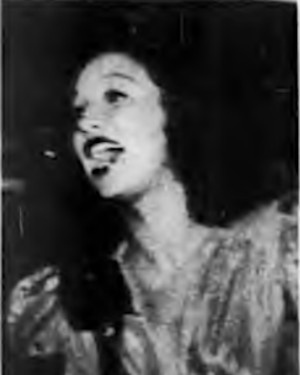Jayne Dover
aka Jane DoverJane Essex

-
Orchestras
Van Alexander
Bunny Berigan
Hudson-DeLange
Eddy Duchin
Joe Haymes
Allan Leafer
Billy Swanson
Claude Thornhill
Boston native Jayne Dover sang with a series of bands in the late 1930s. Originally billing herself as Jane Dover, without the “y”, she worked with Joe Haymes in early 1936 but was out on the night club circuit by later that year. By early 1937, she had joined Eddy Duchin, and by the middle of that year she was with Billy Swanson’s orchestra. Dover made Walter Winchell’s column in June 1937 due to a relationship with South American “scion” Henry Hane, whom Winchell said she would marry. At some point before early 1938 she also sang with Allan Leafer.
By early 1938, Dover had joined the Hudson-DeLange orchestra. After the co-leaders fell out and Eddie DeLange left, Dover remained with the band under Will Hudson’s direction. Hudson received a humorous letter concerning Dover. A man wrote: “I am told you are also a great arranger. Please prove it by arranging for me to take Jane Dover, your band’s singer, to dinner tomorrow night. I’ll be much obliged.” By mid-1938, Dover had begun billing herself “Jayne,” though she was still often called Jane in the press after that date.
In September, Dover joined Bunny Berigan, staying only until November when she became part of Van Alexander’s new band. She remained with Alexander until mid-February 1939. In March, she appeared at the Roxy Theater in New York as a singer working with the Gae Foster girls, a well-known tap dancing line. She disappeared after that, prompting Down Beat magazine to ask twice for her whereabouts. By October 1940, she was singing with Claude Thornhill’s band, where she was billed under the name of Jane Essex.[1] She had left Thornhill by April 1941. In mid-1941, Essex joined a new band put together by Alexander for the summer season. By early 1942, she was on the night club circuit and back to calling herself Jane Dover. She vanishes into the mists of time after that.
A March 1938 article describes Dover as nineteen years old, which would give her a birth year of either 1918 or 1919.
Notes
According to the Middlebury College newspaper, Dover changed her name because people kept asking if she had a brother named Ben. Whether this was just an attempt at juvenile humor by the newspaper staff, or Jane was pulling their leg, or if it was true, is unknown. It’s more likely, however, that Thornhill changed her name, preferring Essex over Dover. The same newspaper article also said that Dover sang with Tommy Dorsey, though there are no sources to back up that claim. ↩︎
Sources
- “Interesting Local News.” The Bolivar Breeze [Bolivar, New York] 2 Apr. 1936: 8.
- Advertisement. “Loretta Lee and Joe Haymes.” Billboard 25 Apr. 1936: 12.
- “Club Chatter.” Billboard 12 Sep. 1936: 19.
- Advertisement. “Earle.” The Washington, D.C., Evening Star 26 Feb. 1937: B-7.
- Winchell, Walter. “On Broadway.” The Danville Bee [Danville, Virginia] 23 Jun. 1937: 6.
- “Notes Over the Air Waves.” The Lowell Sun [Lowell, Massachusetts] 8 Mar. 1938: 15.
- Johnson, Lillian. “Light and Shadows.” The Baltimore African-American 2 Jul. 1938: 11.
- Orodenker, M.H. “Broadway Beat.” Billboard 13 Aug. 1938: 5.
- “Jewish Event Big Success.” Williamsport Gazette and Bulletin [Williamsport, Pennsylvania] 16 Nov. 1938: 3.
- “The Reviewing Stand: Van Alexander.” Billboard 15 Feb. 1939: 15.
- “Vaudeville Reviews: Roxy, New York.” Billboard 18 Mar. 1939: 23.
- “Where Is?” Down Beat Sep. 1939: 2.
- “Where Is?” Down Beat 1 Aug. 1940: 16.
- “Thornhill Band to Visit.” The Salt Lake City Telegram 23 Oct. 1940: 16.
- “We Found!!” Down Beat 15 Jan. 1941: 19.
- “Carnival Ball, Featuring Claude Thornhill's Band, To Be Held Tomorrow Night.” Middlebury Campus [Middlebury, Vermont] 12 Feb. 1941: 4.
- “Big-Time, Here Comes Thornhill.” Down Beat 15 Apr. 1941: 1.
- “Amusements.” The Hanover Evening Sun [Hanover, Pennsylvania] 21 Jun. 1941: 4.
- Advertisement. “Marconi Outing Club.” Warren Times-Mirror [Warren, Pennsylvania] 2 Jan. 1942: 2.
- “Five Years Ago This Month.” Down Beat 1 Sep. 1943: 2.